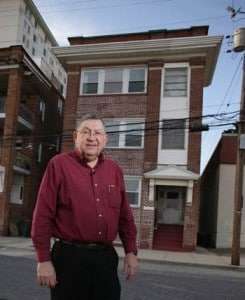The Volokh Conspiracy
Mostly law professors | Sometimes contrarian | Often libertarian | Always independent
Court strikes down taking that is "a manifest abuse of the eminent domain power"

In an important decision issued earlier today, Judge Julio Mendez of the New Jersey Superior Court struck down a taking of a home by the state Casino Reinvestment Development Authority. Under the New Jersey state constitution (as in nearly all other states) the state can only take property for a "public use," and only if it is authorized by the legislature.
In this case, the court ruled that there is no public use, and no legislative authorization either, because the CRDA did not have any clear plan for what it was going to do with the Birnbaum family's house:
In this Court's view, the CRDA is not empowered to condemn a property only to have it sit idly, for years on end, as they wait for the right project to present itself. This has already happened in many of the surrounding properties that sit vacant waiting for a project to come forward …..[T]o meet constitutional and statutory muster, to justify the taking of the Birnbaum property, there must be some reasonable assurance that the Birnbaums' property will be put to a public use within the next year or the next ten years.
Because the CRDA was essentially trying to condemn the property to "bank land in the hopes that it will be used in a future undefined project," Judge Mendez ruled that the condemnation was "a manifest abuse of the eminent domain power."
The ruling is a noteworthy victory for property rights, because state and local governments often condemn property for extremely dubious projects where there is little or no assurance that the promised development will actually occur. The New Jersey case is a more extreme example of the sort of situation that the federal Supreme Court upheld in its notorious 2005 decision in Kelo v. City of New London. More than a decade later, no development has occurred, and the only regular users of the condemned property are feral cats.
The Birnbaum case is even worse than Kelo in so far as at least the City of New London did have at least a somewhat clear development project in mind, whereas the CRDA has basically adopted a "wait and see" approach, hoping that a viable development project will arise in the future. Even if, contrary to the original meaning of the phrase, courts adopt a broad definition of "public use" that includes private development, they should at least ensure that the promised development has some realistic chance of actually happening. There can be no "public use," if the government does not even truly know what the condemned property will be used for.
As Judge Mendez points out, the CRDA's hopes are extremely dubious, given the declining state of the local casino economy. It might have added that the CRDA has a history of undertaking dubious condemnations for the benefit of casino interests, including a well-known case instigated by one Donald Trump. In the long run, the best way to promote economic development in such situations is to respect private property rights.
This decision is far from the end of the struggle against unconstitutional eminent domain abuse, either in New Jersey, or around the country. Much progress has been made since Kelo, but much also remains to be done. But today's ruling is a valuable step in the right direction.
The Institute for Justice, the public interest law firm that represented the Birnbaum family, has more information on the case here. IJ also represented the property owners in Kelo and many other important public use cases.
NOTE: I have done pro bono work for the Institute for Justice in other eminent domain cases. However, I had no involvement in the Birnbaum litigation.


Show Comments (0)